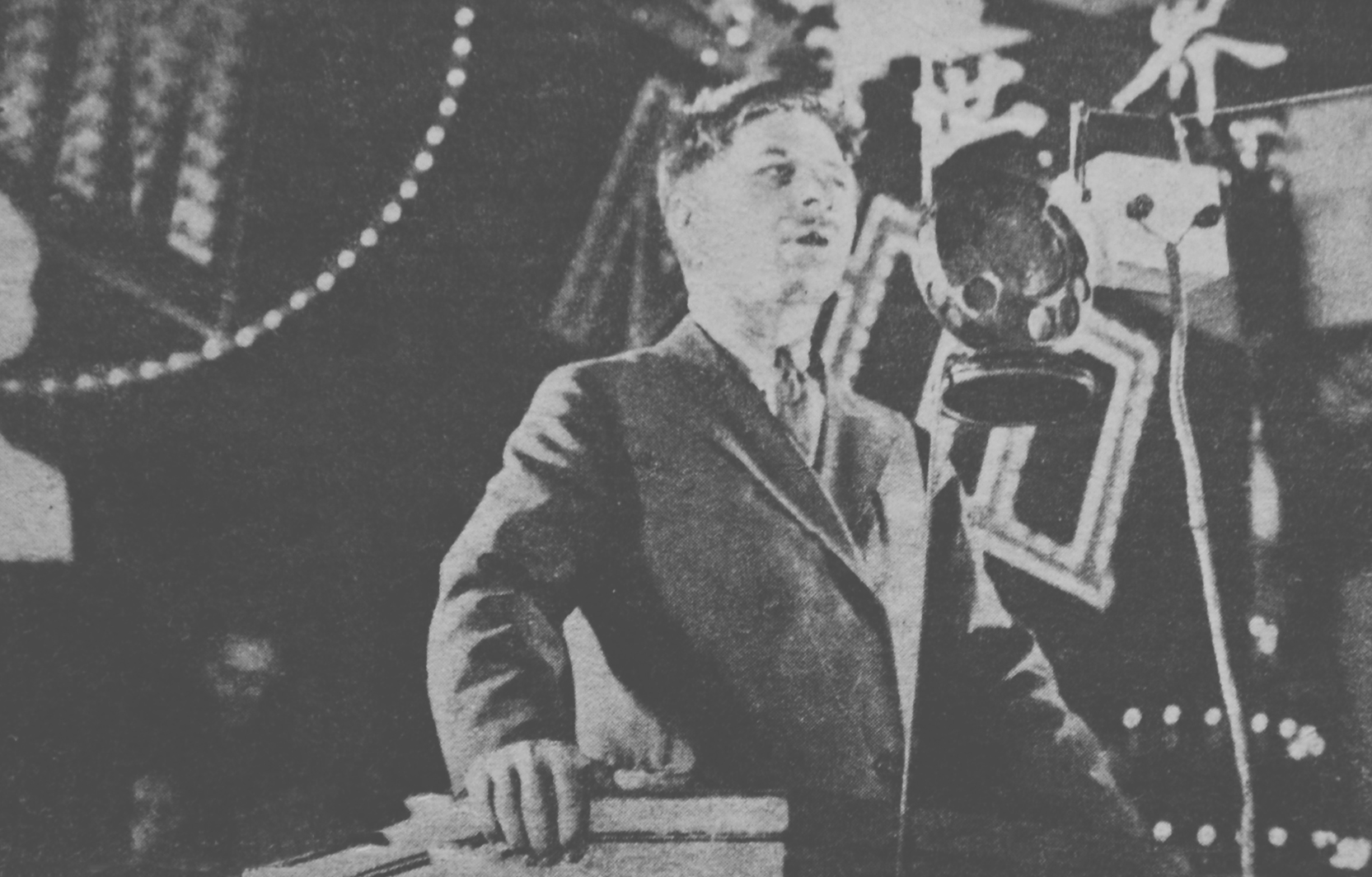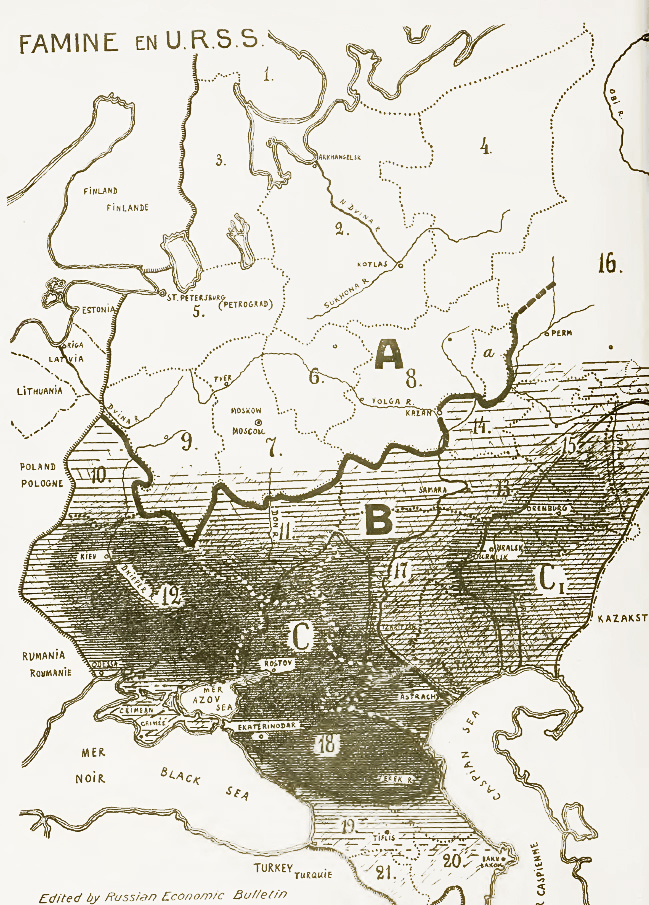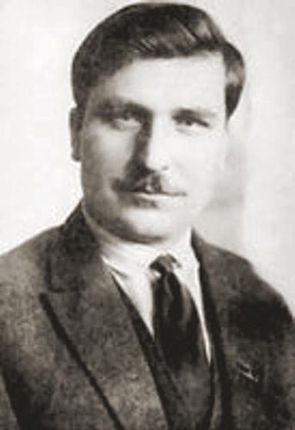|
Postyshev
Pavel Petrovich Postyshev (russian: Па́вел Петро́вич По́стышев; – 26 February 1939) was a Soviet politician, state and Communist Party official and party publicist. He was a member of Joseph Stalin's inner circle, before falling victim to the Great Purge. In 2010, a court in Kyiv judged Postyshev guilty of complicity in genocide because of his part in causing the mass starvation in Ukraine in the early 1930s, known as the Holodomor. Early career Postyshev was born in Ivanovo-Voznesensk in Vladimir Governorate in to the family of a Russian weaver. He was a member of the Russian Social-Democratic Labour Party from 1904, and later joined the Bolshevik faction, and worked fulltime, illegally, as a party organiser. Arrested on 24 April (old style) 1908, he spent four years in Vladimir Central Prison, and then was deported to the Irkutsk region. During the October Revolution, he played a major role in bringing Irkutsk under Bolshevik control, and then in cre ... [...More Info...] [...Related Items...] OR: [Wikipedia] [Google] [Baidu] |
Politburo Of The Communist Party Of The Soviet Union
The Political Bureau of the Central Committee of the Communist Party of the Soviet Union (, abbreviated: ), or Politburo ( rus, Политбюро, p=pəlʲɪtbʲʊˈro) was the highest policy-making authority within the Communist Party of the Soviet Union. It was founded in October 1917, and refounded in March 1919, at the 8th Congress of the Bolshevik Party. It was known as the Presidium from 1952 to 1966. The existence of the Politburo ended in 1991 upon the breakup of the Soviet Union. History Background On August 18, 1917, the top Bolshevik leader, Vladimir Lenin, set up a political bureau—known first as Narrow composition, and after October 23, 1917, as Political bureau—specifically to direct the October Revolution, with only seven members (Lenin, Leon Trotsky, Grigory Zinoviev, Lev Kamenev, Joseph Stalin, Grigori Sokolnikov, and Andrei Bubnov), but this precursor did not outlast the event; the Central Committee continued with the political functions. Howeve ... [...More Info...] [...Related Items...] OR: [Wikipedia] [Google] [Baidu] |
Holodomor
The Holodomor ( uk, Голодомо́р, Holodomor, ; derived from uk, морити голодом, lit=to kill by starvation, translit=moryty holodom, label=none), also known as the Terror-Famine or the Great Famine, was a man-made famine in Soviet Ukraine from 1932 to 1933 that killed millions of Ukrainians. The Holodomor was part of the wider Soviet famine of 1932–1933 which affected the major grain-producing areas of the Soviet Union. While scholars universally agree that the cause of the famine was man-made, whether the Holodomor constitutes a genocide remains in dispute. Some historians conclude that the famine was planned and exacerbated by Joseph Stalin in order to eliminate a Ukrainian independence movement. This conclusion is supported by Raphael Lemkin. Others suggest that the famine arose because of rapid Soviet industrialisation and collectivization of agriculture. Ukraine was one of the largest grain-producing states in the USSR and was subject t ... [...More Info...] [...Related Items...] OR: [Wikipedia] [Google] [Baidu] |
Orgburo
The Orgburo (russian: Оргбюро́), also known as the Organisational Bureau (russian: организационное бюро), of the Central Committee of the Communist Party of the Soviet Union existed from 1919 to 1952, when it was abolished at the 19th Congress of the Communist Party and its functions were transferred to the enlarged Secretariat. Role The Orgburo was established during Lenin's reign to make important decisions about organisational work in the Soviet Union. It oversaw the work of local Party committees and had the power to select and place Communist Party members in positions as it saw fit. The functions of the Orgburo and the Politburo were often interconnected, but the latter was ultimately the final decision-maker. While the Politburo mostly focused on strategic planning and monitoring of the people and status of the country, the Orgburo was tasked with overseeing the Party cadre and its assignment to various positions and duties, presumably i ... [...More Info...] [...Related Items...] OR: [Wikipedia] [Google] [Baidu] |
17th Politburo And The 17th Secretariat Of The All-Union Communist Party (Bolsheviks)
The Politburo of the 17th Congress of the All-Union Communist Party (Bolsheviks) was in session from 1934 to 1939. Composition Members Candidates References {{Communist Party of the Soviet Union Politburo of the Central Committee of the Communist Party of the Soviet Union members 1934 establishments in the Soviet Union 1939 disestablishments in the Soviet Union ... [...More Info...] [...Related Items...] OR: [Wikipedia] [Google] [Baidu] |
First Secretary Of The Communist Party Of Ukraine
The First Secretary of the Central Committee of the Communist Party of Ukraine ( uk, Перший Секретар ЦК КПУ, russian: Первый Секретарь ЦК КПУ) was a party leader of the republican branch of the Communist Party of the Soviet Union. The office' name alternated throughout its history between First Secretary and the General Secretary. While the CPU leader was not officially the leader of Ukraine, he was so ''de facto'' through the Article 6 of the Soviet Constitution, which indicated that the Communist Party of the Soviet Union was the "leading and guiding force of the Soviet society". On October 24, 1990, the provision on the monopoly of the Communist Party of Ukraine on power was excluded from Article 6 of the Constitution of the Ukrainian SSR and accordingly, the first secretary of the Central Committee ceased to be considered the actual head of the republic. The First Secretary was elected at a plenum (plenary session) of the Central Commit ... [...More Info...] [...Related Items...] OR: [Wikipedia] [Google] [Baidu] |
Kyiv Gubernatorial Committee Of The Communist Party Of Ukraine
The Kyiv Gubernatorial Committee of the Communist Party of Ukraine, commonly referred to as the Kyiv CPU gubkom. In 1917 it was preceded by Kyiv Military Revolutionary Committee of Bolsheviks and in 1918-1921 as Kyiv Gubernatorial Revolutionary Committee. The Kyiv Milrevkom was created by Bolsheviks on 9 November 1917 as the Kyiv Military Revolutionary Committee as part of 1917 Kyiv Bolshevik Uprising which followed the Petrograd Bolshevik putsch. To keep the order in the city and region, the Central Council of Ukraine which was granted a self-rule over Ukraine by the Russian Provisional Government created the Regional Committee in Protection of Revolution in Ukraine and allowed to participate all political faction of the city and governorate. At the same time the Central Council of Ukraine had its own Gubernatorial Commissars in each governorate. The post was finally established in the summer of 1919 and existed along with the revolutionary committee until 1921. With eliminati ... [...More Info...] [...Related Items...] OR: [Wikipedia] [Google] [Baidu] |
Lavrentiy Kartvelishvili
Lavrenty Kartvelishvili ( ka, ლავრენტი იოსების ძე ქართველიშვილი; russian: Картвелишвили, Лаврентий Иосифович; 28 April 1890 – 22 August 1938) was a Georgian Bolshevik revolutionary and Soviet politician who served as the First Secretary of the Georgian Communist Party from 11 September to 14 November 1931. Biography A son of a peasant, he was born on 16 (28) April 1890 in the village of Yaneti in Tiflis province. Involved in the revolutionary movement since 1905, he was a member of the Russian Social Democratic Labour Party since 1910. In 1911 he studied at the Kiev Commercial Institute, which he graduated in 1914. During the October Revolution he was in Kiev and became one of the organizers of the struggle for Soviet power in Ukraine. He was chairman of the regional committee of the RSDLP in Kiev, member of the revolutionary and underground district and city committee of the CP in Ode ... [...More Info...] [...Related Items...] OR: [Wikipedia] [Google] [Baidu] |
Joseph Meerzon
Joseph Isaakovich Meerzon (October 31, 1894 – February 10, 1938) was a Bundism, Bundist and later Soviet Union, Soviet politician. He was educated at Moscow State University. He joined the Communist Party of the Soviet Union in 1918 and started as Secretary of the District Committee. From August 1919 to September 1920 he was Chairman of the Vitebsk gubernatorial Committee. He was Secretary of the responsible Tula gubernatorial Committee from December 1920 to May 1923. During the Great Purge, he was arrested on October 10, 1937, sentenced to death by the Military Collegium of the Supreme Court of the USSR on February 8, 1938 and executed by firing squad two days later. After the death of Joseph Stalin, he was posthumously rehabilitated in 1955. Bibliography Przewodnik po historii Partii Komunistycznej i ZSRR (ros.) * http://www.sakharov-center.ru/asfcd/martirolog/?t=page&id=10988 (ros.) {{DEFAULTSORT:Meerzon, Joseph 1894 births 1938 deaths Great Purge victims from Russia ... [...More Info...] [...Related Items...] OR: [Wikipedia] [Google] [Baidu] |
Vladimir Polonsky
Vladimir Ivanovich Polonsky ( az, Владимир Полонски Ыван оғлу, italic=no, Vladimir Polonski Ivan oğlu, russian: Владимир Иванович Полонский; 17 June 1893 – 30 October 1937) was a Soviet politician and the 5th First Secretary of Azerbaijan Communist Party. Early life Polonsky was born to a Jewish family in Tobolsk, Russia. Since 1907, he was a member of the Bolshevik faction of the Russian Social Democratic Labour Party (RSDLP). Starting from 1908, Polonsky has been a sailor and worked blue collar jobs in Saint Petersburg. Political career In 1913, he became a member of union administration. He was jailed for his political activities in 1914. In 1918–1920, he was a division commissar on Western and Southern fronts and the chairman for the southern region of Trade unions in the Soviet Union. In 1930–1933, Polonsky was the First Secretary of the Azerbaijan Communist Party and the Secretary of Transcaucasian Committe ... [...More Info...] [...Related Items...] OR: [Wikipedia] [Google] [Baidu] |
Kyiv Regional Committee Of The Communist Party Of Ukraine
The Kyiv Regional Committee of the Communist Party of Ukraine, commonly referred to as the Kyiv CPU obkom, was the position of highest authority in Kyiv Oblast during most of the existence of the Soviet Union. The position was created on 27 February 1932, and abolished in August 1991 although most authority was lost in June that year to the position of Governor of Kyiv Oblast. The First Secretary was a de facto appointed position usually by the Central Committee the Communist Party of Ukraine or the First Secretary of the Republic. First Secretaries The following individuals served as first secretaries of the Kyiv Regional Committee of the Communist Party of Ukraine. Notes See also *Governor of Kyiv Oblast The Governor of Kyiv Oblast ( uk, Губернатор Київської області, ) or officially, the Chairman of the Kyiv Oblast State Administration ( uk, Голова Київської обласної державної адміні� ... * Kyiv City Committee ... [...More Info...] [...Related Items...] OR: [Wikipedia] [Google] [Baidu] |
Nikolai Demchenko
Nikolai Nesterovich Demchenko (21 May 1896 – 30 October 1937) was a Ukrainian communist and Soviet politician. He was born in Lebedyn, Kharkov Governorate and became a member of the Bolshevik Party in 1916. He received the Order of Lenin on 20 December 1935. During the Great Purge, he was arrested on 22 July 1937, sentenced to death by the Military Collegium of the Supreme Court of the USSR on 29 October 1937 and executed by firing squad the next day. After the death of Joseph Stalin Joseph Vissarionovich Stalin (born Ioseb Besarionis dze Jughashvili; – 5 March 1953) was a Georgian revolutionary and Soviet political leader who led the Soviet Union from 1924 until his death in 1953. He held power as General Secreta ..., he was rehabilitated. References {{DEFAULTSORT:Demchenko, Nik 1896 births 1937 deaths People from Lebedyn People from Kharkov Governorate Bolsheviks Central Committee of the Communist Party of the Soviet Union candidate members Peopl ... [...More Info...] [...Related Items...] OR: [Wikipedia] [Google] [Baidu] |
Sergei Aleksandrovich Kudryavtsev
Sergei Aleksandrovich Kudryavtsev (1903 – April 25, 1938) was a Ukrainian Soviet politician and statesman. He was born in Kharkiv. During the Great Purge, he was arrested on October 13, 1937 and later executed by firing squad. After the death of Joseph Stalin Joseph Vissarionovich Stalin (born Ioseb Besarionis dze Jughashvili; – 5 March 1953) was a Georgian revolutionary and Soviet political leader who led the Soviet Union from 1924 until his death in 1953. He held power as General Secreta ..., he was rehabilitated in 1956. Bibliography Przewodnik po historii Partii Komunistycznej i ZSRR (ros.)* http://www.alexanderyakovlev.org/almanah/almanah-dict-bio/1006037/9 (ros.) * http://www.sakharov-center.ru/asfcd/martirolog/?t=page&id=8273 (ros.) {{DEFAULTSORT:Kudryavtsev, Serg 1903 births 1938 deaths Politicians from Kharkiv People from Kharkov Governorate Ukrainian communists Soviet politicians Politburo of the Central Committee of the Communist Party of ... [...More Info...] [...Related Items...] OR: [Wikipedia] [Google] [Baidu] |





